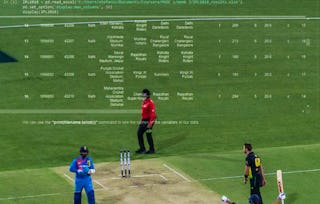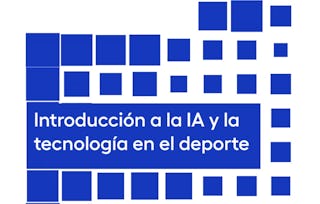In this course students will explore supervised machine learning techniques using the python scikit learn (sklearn) toolkit and real-world athletic data to understand both machine learning algorithms and how to predict athletic outcomes. Building on the previous courses in the specialization, students will apply methods such as support vector machines (SVM), decision trees, random forest, linear and logistic regression, and ensembles of learners to examine data from professional sports leagues such as the NHL and MLB as well as wearable devices such as the Apple Watch and inertial measurement units (IMUs). By the end of the course students will have a broad understanding of how classification and regression techniques can be used to enable sports analytics across athletic activities and events.

Introduction to Machine Learning in Sports Analytics

Introduction to Machine Learning in Sports Analytics
This course is part of Sports Performance Analytics Specialization

Instructor: Christopher Brooks
5,313 already enrolled
Included with
27 reviews
Recommended experience
What you'll learn
Gain an understanding of how classification and regression techniques can be used to enable sports analytics across athletic activities and events.
Skills you'll gain
- Data Preprocessing
- Classification And Regression Tree (CART)
- Applied Machine Learning
- Data Analysis
- Model Evaluation
- Predictive Modeling
- Machine Learning
- Feature Engineering
- Scikit Learn (Machine Learning Library)
- Analytics
- Predictive Analytics
- Decision Tree Learning
- Python Programming
- Supervised Learning
- Classification Algorithms
- Machine Learning Algorithms
- Logistic Regression
- Skills section collapsed. Showing 8 of 17 skills.
Details to know

Add to your LinkedIn profile
4 assignments
See how employees at top companies are mastering in-demand skills

Build your subject-matter expertise
- Learn new concepts from industry experts
- Gain a foundational understanding of a subject or tool
- Develop job-relevant skills with hands-on projects
- Earn a shareable career certificate

There are 4 modules in this course
This week will introduce the concept of machine learning and describe the four major areas of places it can be used in sports analytics. The machine learning pipeline will be discussed, as well as some common issues one runs into when using machine learning for sports analytics.
What's included
7 videos3 readings1 assignment1 ungraded lab
In this week students will learn how Support Vector Machines (SVM) work, and will experience these models when looking at both baseball and wearable data. Coming out of the week students will have experience building SVMs with real data and will be able to apply them to problems of their own.
What's included
4 videos2 readings1 assignment
This week will focus on interpretable methods for machine learning with a particular focus on decision trees. Students will learn how these models work in general, and see special uses of decision trees in combination with regression methods. In this week students will come to better understand how the python sklearn toolkit can be used for a breadth of supervised learning tasks.
What's included
4 videos2 readings1 assignment
In this week of the course students will learn how many different models can be used together through ensembles, including the random forest method as a common use, as well as more general methods available in sklearn such as stacking and bagging. By the end of this week students will have a broad understanding of how methods such as SVMs, decision trees, and logistic regression can be used together to solve a problem with increasing performance.
What's included
5 videos3 readings1 assignment
Earn a career certificate
Add this credential to your LinkedIn profile, resume, or CV. Share it on social media and in your performance review.
Instructor

Offered by
Explore more from Data Analysis
 Status: Free Trial
Status: Free TrialUniversity of Michigan
 Status: Free Trial
Status: Free TrialUniversity of Michigan
 Status: Free Trial
Status: Free TrialUniversity of Michigan
 Status: Free Trial
Status: Free TrialReal Madrid Graduate School Universidad Europea
Why people choose Coursera for their career

Felipe M.

Jennifer J.

Larry W.

Chaitanya A.
Learner reviews
- 5 stars
81.48%
- 4 stars
11.11%
- 3 stars
3.70%
- 2 stars
3.70%
- 1 star
0%
Showing 3 of 27
Reviewed on Oct 24, 2022
Very hands-on course, I could understand all techniques available to model sports.
Reviewed on Apr 11, 2024
What an awesome course, interesting, challenging, gives new perspective and useful insights
Reviewed on Oct 30, 2024
Provide solid foundation for beginning supervised ML

Open new doors with Coursera Plus
Unlimited access to 10,000+ world-class courses, hands-on projects, and job-ready certificate programs - all included in your subscription
Advance your career with an online degree
Earn a degree from world-class universities - 100% online
Join over 3,400 global companies that choose Coursera for Business
Upskill your employees to excel in the digital economy
Frequently asked questions
To access the course materials, assignments and to earn a Certificate, you will need to purchase the Certificate experience when you enroll in a course. You can try a Free Trial instead, or apply for Financial Aid. The course may offer 'Full Course, No Certificate' instead. This option lets you see all course materials, submit required assessments, and get a final grade. This also means that you will not be able to purchase a Certificate experience.
When you enroll in the course, you get access to all of the courses in the Specialization, and you earn a certificate when you complete the work. Your electronic Certificate will be added to your Accomplishments page - from there, you can print your Certificate or add it to your LinkedIn profile.
Yes. In select learning programs, you can apply for financial aid or a scholarship if you can’t afford the enrollment fee. If fin aid or scholarship is available for your learning program selection, you’ll find a link to apply on the description page.
More questions
Financial aid available,

